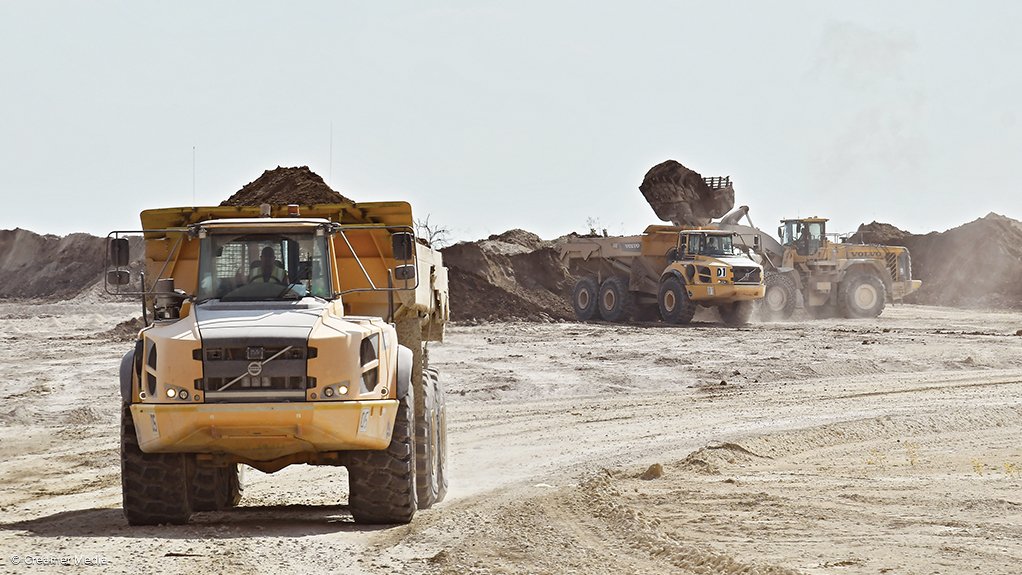Consider compliance when buying second-hand TMMs


SECOND-HAND SUPPORT Mines that decide to buy machinery on auction are those that have strong maintenance teams that can undertake on-site rebuilds
Photo by Creamer Media's Donna Slater
Mining companies buying second-hand trackless mobile machines (TMMs) on auction need to ensure that only proximity detection systems (PDSes) from suppliers that have been approved by the original-equipment manufacturer (OEM) are fitted to such machines when complying with the Mine Health and Safety Act (MHSA), says surface mining industry body Aspasa director Nico Pienaar.
“OEMs and PDS suppliers are still working out the rules and cooperation agreements. It makes sense that an OEM won’t allow just any system to be installed on its machinery. We see this with light duty vehicles in the market.”
Although, industry cluster organisation Mining Equipment Manufacturers of South Africa CEO Ossie Carstens says this is not a deal breaker.
“A mine will retrofit and install a PDS that is compatible with its infrastructure. Therefore, an OEM will abide by the requirements of the mine and install a system as per its codes of practice.”
He adds that an OEM must ensure that all its safety devices are able to communicate with any communications protocol, which are typically based on standards recognised and accepted internationally.
The MHSA stipulates that all TMMs need to be fitted with PDSes in the next year or more to ensure that these machines stop before colliding with another vehicle, pedestrian or a structure, Pienaar explains.
“This is not yet compulsory for surface mines, as there are few OEM Level 9-ready TMM models – which are able to ensure nonoperator intervention to slow down and stop – that are compliant. We cannot implement this law if there are no processes in the market that are 100% infallible.”
“When all is going well again” – that is, South Africa experiences economic upturn, which has been hindered by the Covid-19 outbreak and the country’s subsequent lockdown – Pienaar expects interest in mining auctions to improve.
He notes that, prior to the lockdown, the country’s sluggish economy had slowed infrastructure development on which the surface mining sector relies.
“The sector needs a more positive outlook on South Africa’s economic activity, which is partly government’s issue to address.”
Meanwhile, Carstens believes that there could be scope for buying and selling of second-hand pieces of equipment following the lockdown.
“It all depends on how the country emerges from this Covid-19 crisis and how many mines will barely survive or, conversely, blossom, as our mining landscape will be totally different.”
Pienaar says mostly yellow machines are in demand at mining auctions, which offer a cheaper means of procuring such machinery.
However, there is the risk of not knowing if this machinery has been misused, properly serviced or has an existing fault that is not visible without closer inspection.
He tells Mining Weekly that surface mining companies generally tend not to buy new machines as this is more costly than buying second-hand machines, of which there are a surplus.
Meanwhile, Carstens says, in his experience, mines typically only buy “new pieces of kit” when their boards vote to make funds available.
“Performance of kit against expectations is key to satisfy key financial ratios that a board would use to make their decisions.”
He agrees with Pienaar, noting that the mines that decide to buy on auction are those that have strong maintenance teams that can undertake on-site rebuilds, adding that they typically buy these machines funded from operating expenditure budgets, instead of capital expenditure budgets.
“These are typically short-term decisions and are used as interventions to get them to the next financing cycle or through depressed market cycles,” Carstens concludes.
Article Enquiry
Email Article
Save Article
Feedback
To advertise email advertising@creamermedia.co.za or click here
Announcements
What's On
Subscribe to improve your user experience...
Option 1 (equivalent of R125 a month):
Receive a weekly copy of Creamer Media's Engineering News & Mining Weekly magazine
(print copy for those in South Africa and e-magazine for those outside of South Africa)
Receive daily email newsletters
Access to full search results
Access archive of magazine back copies
Access to Projects in Progress
Access to ONE Research Report of your choice in PDF format
Option 2 (equivalent of R375 a month):
All benefits from Option 1
PLUS
Access to Creamer Media's Research Channel Africa for ALL Research Reports, in PDF format, on various industrial and mining sectors
including Electricity; Water; Energy Transition; Hydrogen; Roads, Rail and Ports; Coal; Gold; Platinum; Battery Metals; etc.
Already a subscriber?
Forgotten your password?
Receive weekly copy of Creamer Media's Engineering News & Mining Weekly magazine (print copy for those in South Africa and e-magazine for those outside of South Africa)
➕
Recieve daily email newsletters
➕
Access to full search results
➕
Access archive of magazine back copies
➕
Access to Projects in Progress
➕
Access to ONE Research Report of your choice in PDF format
RESEARCH CHANNEL AFRICA
R4500 (equivalent of R375 a month)
SUBSCRIBEAll benefits from Option 1
➕
Access to Creamer Media's Research Channel Africa for ALL Research Reports on various industrial and mining sectors, in PDF format, including on:
Electricity
➕
Water
➕
Energy Transition
➕
Hydrogen
➕
Roads, Rail and Ports
➕
Coal
➕
Gold
➕
Platinum
➕
Battery Metals
➕
etc.
Receive all benefits from Option 1 or Option 2 delivered to numerous people at your company
➕
Multiple User names and Passwords for simultaneous log-ins
➕
Intranet integration access to all in your organisation



















